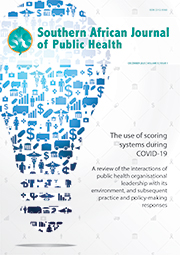Research

‘You need to keep on looking to see how to improve it.’ Lessons from a learning initiative in primary healthcare facilities in Cape Town, South
Abstract
Background. The capacity of health systems globally to respond, learn and adapt has been brought into focus by the COVID-19 crisis. To enhance the adaptive capacity of health services, it is necessary that organisations develop learning as a core value, and institutionalise a learning process. Enhanced organisational agility implies the empowerment of micro-level actors who have the most immediate view of what is required in local contexts. Grassroots empowerment and a shift to distributed leadership often sit in tension with steep hierarchies and compliance mechanisms prevailing in many health systems. Primary healthcare (PHC) facilities in the City of Cape Town, South Africa, operate in a system that is typically hierarchical, leading to feelings of disengagement in frontline staff, hindering their responsiveness to challenges.
Objectives. To report on an initiative aimed at propagating organisational learning at PHC facilities using an iterative process of collaboration, experimentation and peer support, primarily focusing on the roles and experiences of PHC managers who were involved in the initiative. Despite strong initial support and signs of nascent learning, contextual factors undermined the process. This ultimately derailed efforts to embed and institutionalise organisational learning. Insights from the process could inform future learning initiatives.
Methods. A qualitative, exploratory design was used. Data collection involved individual semi-structured interviews with a sample of 12 health facility managers and two personal PHC managers, as well as document reviews.
Results. Facility managers had a positive perception of the participatory approach to planning, underpinned by peer-support workshops at which senior management endorsed the project and encouraged innovation. Scheduling systems were implemented where previous top‑down instructions failed to achieve this. However, a change in senior management and organisational restructuring led to lack of support and a reversion to top-down implementation, which undermined the project.
Conclusions. The use of a grassroots learning approach, with sufficient support and clear endorsement from top-level management, can strengthen learning capacity at grassroots level. However, such efforts are vulnerable to derailment, particularly if the wider healthcare system remains rooted in a hierarchical tradition. They require long-term and stable commitments, particularly from senior leaders. Measures to safeguard future initiatives should be explored.
Authors' affiliations
U Walmisley, School of Public Health, University of the Western Cape, Bellville, Cape Town, South Africa
U Lehmann, School of Public Health, University of the Western Cape, Bellville, Cape Town, South Africa
M Lembani, School of Public Health, University of the Western Cape, Bellville, Cape Town, South Africa
Full Text
Cite this article
Article History
Date published: 2022-04-12
Article Views
Full text views: 1010

.jpg)


Comments on this article
*Read our policy for posting comments here